| Category | Dissertation | Subject | Education |
|---|---|---|---|
| University | University of Chester | Module Title | MD7100 Research Dissertation Handbook |
| Word Count | 6000 Words |
|---|---|
| Assessment Title | Module Handbook |
| Academic Year | 2024-25 |
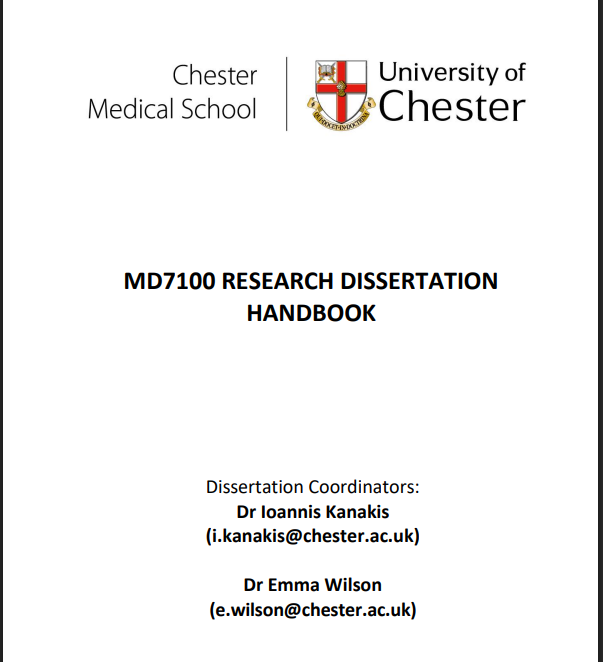
This handbook contains important information to help you through the research dissertation of your MSc programme. You must read it carefully and keep it as a valuable reference throughout this process. Where the guidance is not clear or you require additional information, you can also seek help from either of the dissertation coordinators or your dissertation supervisor.
The following summarises key details concerning the research dissertation module:
The research stage of your MSc may be one of the most challenging aspects of your studies. Success in the planning, development, execution and completion of the dissertation project will require great discipline and organisation. You will need around 600 hours of study to complete the dissertation project (the dissertation represents the equivalent of three 20-credit modules). This includes time spent searching the literature, reading, preparing a research proposal, planning, collecting and processing data, analysing and interpreting data, writing the research article and preparing and delivering the oral viva presentation.
The dissertation module is your opportunity to put the information, skills and ideas you have gathered in the taught elements of the program into practice and generate your own unique contribution to your chosen discipline – students often view their research project as the most rewarding and enjoyable aspect of their studies.
In addition to the academic standards required for level 7 study, which you should now be familiar with, the successful completion of the research dissertation will require and develop the following skills:
These skills will be important throughout your career and will be valued by current and future employers.
Biggam, J. (2017). Succeeding with your master's dissertation: A step-by-step handbook (Fourth ed.). London, United Kingdom: Open University Press
Blaxter, L., Hughes, C. & Tight, M (2010) How to research. Maidenhead: Open University Press.
Harris, M., Taylor, G., & Taylor, J. (2013). Maths & stats: For the life and medical sciences (Second ed.). Banbury: Scion Publishing.
Holmes, D., Moody, P., Dine, D., & Trueman, L. (2017). Research methods for the biosciences (Third ed.). Oxford, United Kingdom: Oxford University Press.
Kumar, R. (2019) Research methodology: A step-by-step guide for beginners (5th edition) London: Sage.
Mitchell, M. L., & Jolley, J. M. (2013). Research design explained (8th, International ed.). Australia; Belmont, CA: Wadsworth Cengage Learning.
Oliver, P. (2010) The student’s guide to research ethics (2nd edition) Buckingham: Open University Press.
Saks, M and Allsop, J. (2019). Researching Health, Qualitative, Quantitative and Mixed Methods. (3rd Edition). Sage. London.
This is a general overview of the dissertation processes if you are undertaking your project at the University of Chester. The timescale of each project will vary and you should discuss this with your supervisor.
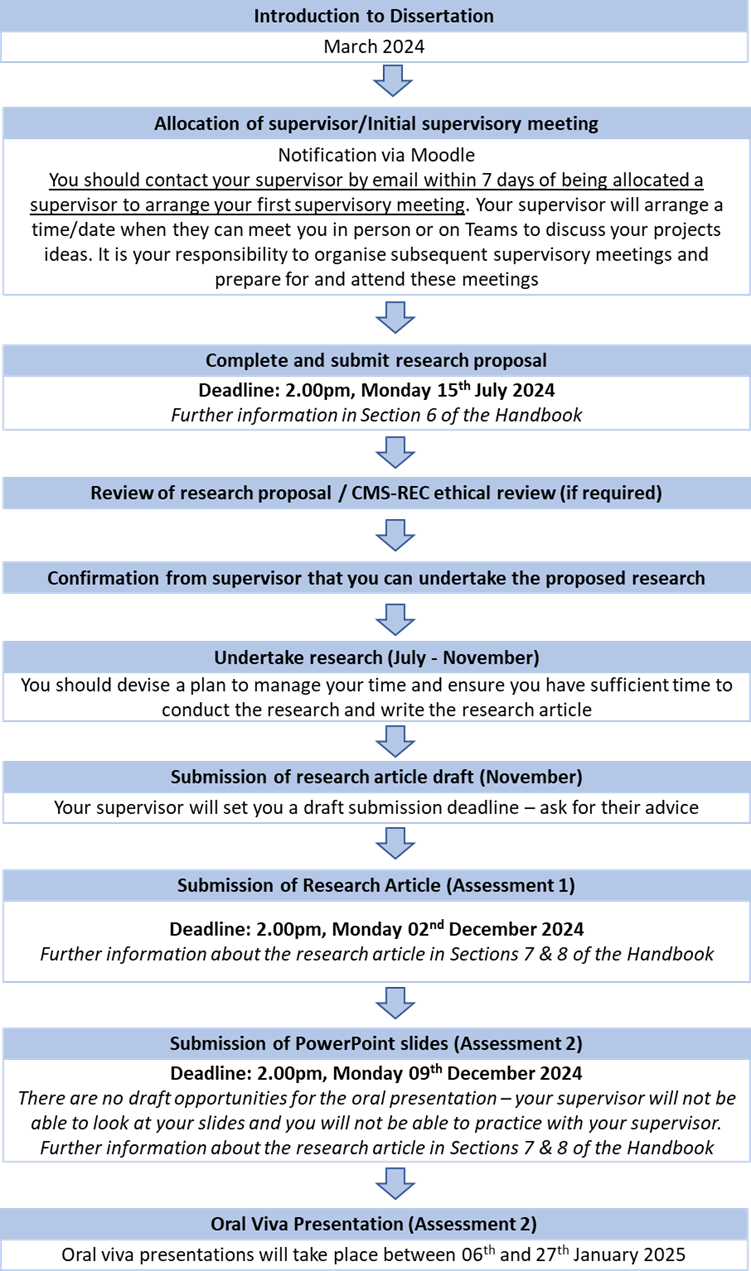
Once you have expressed your research interests to the dissertation co-ordinators (completion of the project interest form), you will be allocated a supervisor to support you with your dissertation project. Your supervisor will be a valuable resource to you and although it is possible to complete your dissertation without much input for the supervisor, it is inadvisable.
The supervisor’s role is to provide advice and guidance to achieve success, but day-to-day management of the research is not the role of the supervisor. The ownership of the research project is the responsibility of you as the student.
The supervisor's role is principally:
1. To provide direction on aspects of your research such as:
2. To give guidance about the standard of work expected.
3. To monitor and make recommendations on progress
The expectations of students and supervisors are likely to be different and it is worthwhile considering these as it will aid in the formation of a good working relationship.
As a student you may expect a supervisor who:
Supervisors are likely to expect students to:
As a general rule, a supervisor will endeavour to respond to a student’s correspondence within one week of it being received unless he/she is away from the University or on annual leave.
It is your responsibility as a student to seek advice and/or arrange appointments with your allocated supervisor. The supervisor is not obliged to seek you out if you fail to take up the support offered.
It is the supervisor's responsibility to make available time when students may arrange meetings and to inform students of any extended unavailability during the course of the research project. Supervisors are likely to take annual leave at some point during the project, they should make you aware of these dates and it is your responsibility to arrange a meeting before they go on annual leave, if required.
Supervisory meetings are likely to be held online via Teams – you are encouraged to turn your camera on for supervisory meetings, but this is not compulsory.
Supervisors expect students not to cancel meetings at short notice or – worse – to fail to attend planned meetings
It is the students’ responsibility to initiate meetings and students should be well prepared for meetings. It is generally useful if the supervisor is given a brief outline summarising the key points for discussion in advance.
When seeking advice it will not be deemed acceptable to say “I have all this data – HELP – I don’t know what to do with it.” You should in the first instance make a personal attempt to determine what the best strategy is. It is much more appropriate to seek advice with the statement “I have examined my data using the [... named …] statistical test for the following reasons […stated …] and I am having the following difficulty [… given in summary …].
All students are advised to maintain a record of communication and meetings with their dissertation supervisor along with any agreed action points. A template to record these meetings can be found on MD7100 Moodle Page.
Although there is no set number of meetings/emails required, it is anticipated that certain stages of the research thesis process may require you to be in contact with your supervisor more often than at other stages. For example, you may find that you need more support at the research proposal or data analysis phase than at any other time. It is in your interest to maintain contact throughout the project with your supervisor.
Whilst you are working on your dissertation, you may on occasions, be considering seeking help from someone other than your supervisor. In the first instance, you should contact the dissertation coordinators who may be able to guide you in seeking extra support. If you intend to seek advice from another member of staff, or from anyone external to the University, it is important that you inform your supervisor who may make the first contact for you.
Throughout the taught elements of your programme you will have read widely and thought of/been introduced to many interesting topics for a potential research project.
Sources of potential ideas for research include:
As an MSc student you must develop a personal research idea into a worthwhile and feasible study. Support is available from your supervisor and you should discuss your initial ideas with them.
A wide variety of project topics are acceptable provided it is relevant to your programme but whatever your ideas, there must be of sufficient content to allow you to demonstrate a wide understanding of research methods and appropriate analyses for level 7 study.
Depending on your programme of study, your dissertation research project can take various. If you are undertaking the MSc in Biomedical Science, IBMS accreditation requires you to undertake a project which is based on data-generation and evaluation.
Types of research projects which you can undertake will broadly fall under one of the following categories:
Those who envisage undertaking a project within the workplace (namely those whom are part-time students), usually undertake a project that is relevant/of use to the workplace. If you are in this situation, you should already have an idea of what projects you may be able to pursue – ask your line manager for advice on this and discuss with your dissertation supervisor. Please be aware about ethical approval for projects undertaken in the workplace – they may require ethical approval from your supervisor. Again, seek advice from your line manager and supervisor.
Whatever your chosen topic, there are several vital elements to consider when turning your idea into something researchable:
What do you want to Find Out?
Few first-time researchers have a clear research question or hypothesis at the outset. It is more likely that you have an idea, topic or problem that you want to explore. Therefore, at this stage and all future stages, discuss ideas with your supervisor. Also, at this initial stage, you will need to spend a lot of time refining your research question. You can do this by thoroughly evaluating the literature to identify any gaps in current knowledge or understanding.
Define what you want to find out. Set aims and objectives, then formulate a very clear research question or draw up a testable hypothesis. Remember that often what you wish to research and what is researchable are two different things. You will likely need to narrow the focus of your original research idea in order for it to be executed in a practical and timely manner.
What Resources are Available to You?
Here you should think of resources in the broadest sense, to include both your skills and the access you have to sources of equipment and literature. You must be practical when planning your study. Your skills may influence the research question, design, any intervention and measurements. You should consider:
How Much Time Have You Got?
It is very important to consider the time-scale of the project. Everyone is on a tight timescale and must plan the research very carefully and thoroughly. When planning the scheduling of your research be realistic about your other commitments and do not forget to build a couple of weeks of contingency time into the plan to deal with the inevitable crises.
You need to consider the following:
It is useful that you draw up a timetable for your research. Good time management through the research process is key to successful completion of a research project.
Is the Project financially Viable?
Your supervisor will be able to advise you whether your proposal is financially viable during your initial discussions regarding your research ideas.
This flow chart provides an overview of the research approval process, further information is available on the following pages.
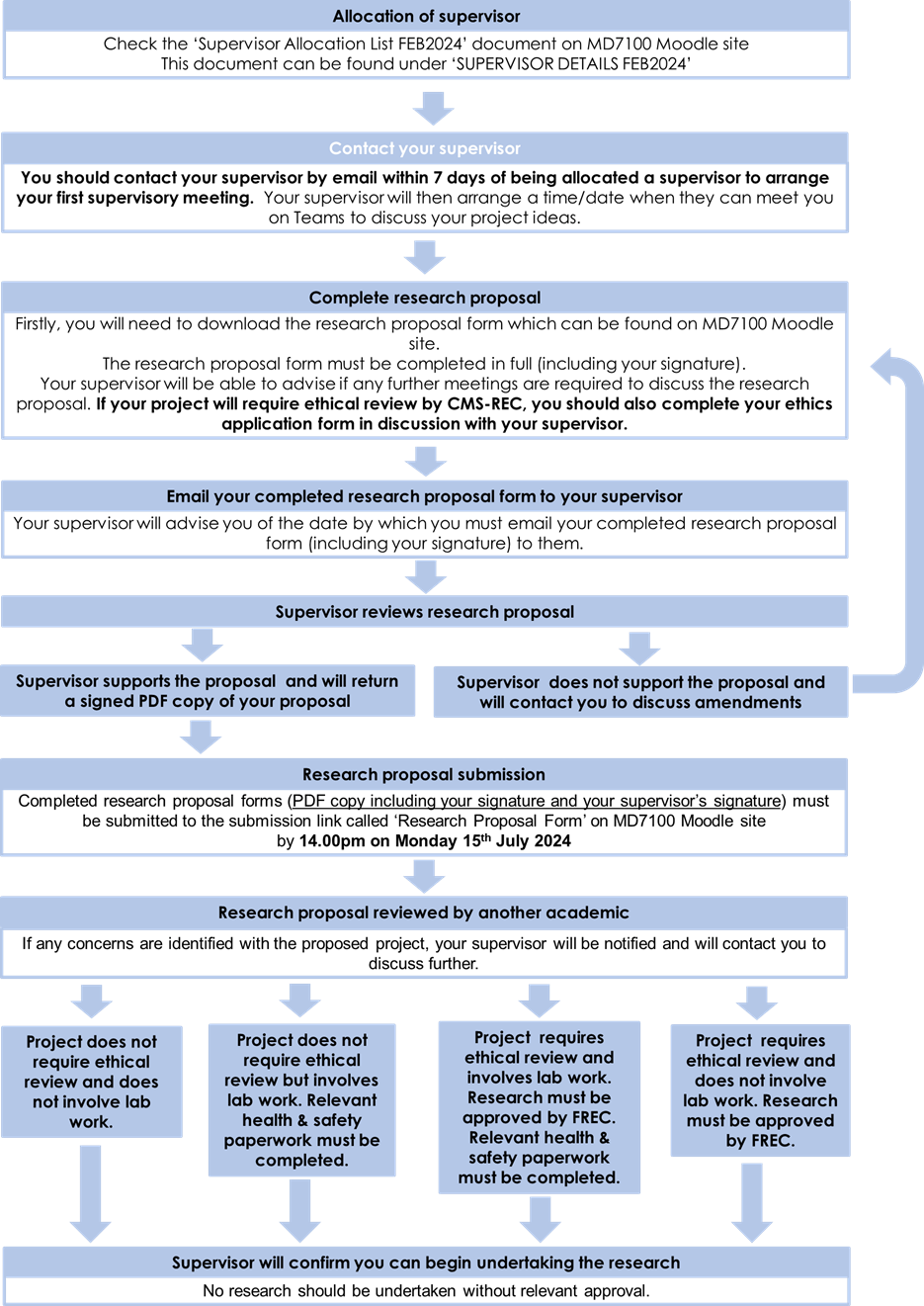
You will receive a message via MD7100 news forum when supervisors have been allocated. Where possible, all students will be notified of supervisor allocations at the same time. You will then need to go onto MD7100 Moodle Site, under ‘SUPERVISOR DETAILS (FEB2024)’, you will find a ‘Supervisor Allocation List’ as well as supervisor contact details.
It is your responsibility to then contact your supervisor by email within 7 days to arrange your first supervisory meeting. Your supervisor will then arrange a time/date when they are available to meet with you on Teams to discuss your initial project ideas. This initial advice will focus on whether the subject you have chosen is likely to be suitable for a MSc level dissertation and feasible to complete. All projects should be carefully considered in discussion with your supervisor. Your supervisor will then ask you to complete a research proposal. Your supervisor will be able to advise if any further meetings are required to discuss the research proposal.
If your project will require ethical review, you should also complete an ethics application form in discussion with your supervisor. See Section 6 for further guidance on ethical review processes.
Firstly, you will need to download the research proposal form, which can be found on the MD7100 Moodle site under ‘RESEARCH PROPOSAL (FEB2024)’. The document is a Word document, which you must download and complete. If you are unable to download the document, please contact one of the dissertation coordinators.
There are eight sections of the form which must be completed in full:
Section A: Student/Programme Details
Section B: Project Type
Section C: Project Aims and Objectives
Section D: Permission and other considerations Section E: Human Ethical Considerations Section F: Further Information
Section G: Data storage – Compliance with GDPR and data protection
Section H: Student Declaration
Section I: Supervisor Review
Further guidance is available on the form. If you are unsure how to complete the research proposal, please contact your supervisor.
Once you have completed the form (including your signature), you will need to email this to your supervisor by the date set by your supervisor. Please note this will be in advance of the research proposal submission deadline, as your supervisor needs to review your proposal, and changes may be required. If your supervisor does not support the proposal, they will contact you to discuss amendments. If your supervisor supports the proposal, they will return a signed PDF copy of your proposal. Once your supervisor has signed the form, you must not make any changes before submission.
Research Proposal Submission Details
Research Proposal Form
Your research proposal will then be reviewed by another academic, independent of your project. If any concerns are identified with the proposed project, your supervisor will be notified and will contact you to discuss further.
If your research is approved, there will be four main outcomes:
1. Project does not require any further ethical review and does not involve lab work – Your supervisor will confirm that you can begin undertaking the research
2. Project does not require any further ethical review but involves lab work.
3. Research requires ethical review and involves lab work
4. Research requires ethical review but does not involve lab work.
Project proposals involving human subjects/tissue samples must have ethical approval and will be subject to formal consideration by an appropriate ethics committee:
OR
OR
Research Ethics Committees focus their reviews on the following:
Your dissertation supervisor or dissertation coordinator will be able to advise if your research will require ethical approval. If in doubt – ask.
Students should seek the advice of their supervisor regarding procedures for ethical review. No applications must be submitted for ethical review (whether internal or external to the University) without the approval of the dissertation coordinator and supervisor.
No data collection should be undertaken before receiving a letter of ethical approval.
No research dissertation will be considered for assessment if appropriate research ethics procedures have not been followed.
The University of Chester empowers faculties to appraise students’ projects in their domain for their ethical nature. The Faculty of Medicine and Life Sciences requires all research that involves human or animal participants, their tissue and/or data to have an ethical review. FREC receives and reviews applications from postgraduate students from all departments across the Faculty where submission to an external Research Ethics Committee is not required.
More details about CMS-REC requirements and deadlines are available on the Chester Medical School Research Ethics Committee (CMS-REC) website.
Applicants are reminded to:
For more information, please contact the Chair of the Committee, Dr Gareth Jones (g.jones@chester.ac.uk)
Gaining ethical approval can take time and therefore if your project requires ethical approval, this must be gained as soon as possible.
Please note that the committee meets only on pre-determined dates (once a month) and for each meeting there will be a deadline before which your application must be submitted.
Applications are reviewed on a ‘first submitted, first reviewed’ basis and in cases of large volumes of applications being received it is possible that some applications may be referred to an ‘overspill’ meeting for review. Please be aware that this will result in a two-week delay. Following the meeting, it may take several weeks to gain approval if the committee requires further information/clarification on your application.
Therefore, it is vital you submit your application as soon as possible. A list of dates of CMS-REC deadlines and meetings is available on the CMS-REC website.
Work conducted within the NHS will require local R&D approval. Arrangements for submission of your application will vary from place to place and specific local advice may be needed.
The Research Ethics Service (RES) is committed to enabling and supporting ethical research in the NHS. It protects the rights, safety, dignity and wellbeing of research participants.
A useful decision tool is available online to help you determine if your study requires NHS Research Ethics Committee approval.
Application forms must be completed through the Integrated Research Application System (IRAS).
If you are undertaking a project at your workplace which requires RES ethical approval, you should send a copy of the approval letter to your supervisor at the University and also submit a copy to the supplementary information submission inbox. You may also need ethical approval through the University but your supervisor will be able to advise on this.
You will be required to submit your dissertation in the form of research article suitable for publication, followed by an oral viva presentation to discuss the research undertaken.
There are a number of advantages to using these assessment types:
The assessment requirements are outlined below. Each assessment must be submitted electronically via the relevant submission links on MD7100 Moodle Site under the topic ‘ASSESSMENT SUBMISSION (FEB2024)’. It is your responsibility to submit the relevant file to the correct inbox.
Assessment 1 Requirements
Research article written in a style suitable for publication in a peer reviewed journal.
This assessment accounts for 70% of the module mark
The word count for the research article is 6000 words.
Assesses learning outcomes 1-4
You must include a cover page with your signed declaration (Appendix A).
Assessment 1 Deadline
Assessment 1 Submission Details
You must submit two identical copies of your research article to two separate submission inboxes:
This is to allow independent marking of your research article. You must submit two copies.
You must submit PDF files
Assessment 2 Requirements
Oral viva presentation critically discussing the research undertaken.
This assessment accounts for 30% of the module mark
The presentation should last a maximum of 15 minutes, this will be followed by questions from the assessors.
Assesses learning outcomes 5
Assessment 2 Deadline
Viva presentations will take place between 11th and 30th September 2024. You will be advised of the date, time and location of your viva presentation closer to the time.
Assessment 2 Submission Details
You must submit one copy of your presentation slides as a PowerPoint file to the following submission inbox:
You will only be permitted to present the PowerPoint slides that you have submitted through Turnitin
Please note that you will not be permitted to undertake the oral viva presentation if you have not submitted the research article and PowerPoint presentation slides.
Supplementary Information Requirements
This is an optional submission
You should include additional information that, whilst not necessary for the main body of the paper, provides the markers with evidence of the thoroughness with which the study was conducted. It can include the following:
Words in the supplementary information submission do not contribute to the word count for the research article
Supplementary Information Deadline
Supplementary Information Submission Details
You must submit a single PDF file to the following submission inbox:
Supplementary Information (Optional)
You are encouraged to submit your work well in-advance of the deadline. For the research article, you are required to submit two copies to two submission inboxes – the time/date of the latest submission will be taken as your submission details. Please ensure you therefore allow enough time to submit both submissions. There are a large number of students on this module and there may be delays if you try to submit close to the deadline.
Late work will be penalised – the penalty is 5 marks for work submitted up to 24 hours after a deadline, and 5 marks per day after this, including weekends.
7-day extensions (self-certification) are permitted for assessment 1: research article only. If you are unable to submit by the deadline and need an extension longer than 7 days, you will only be permitted to apply for a deferral until the next assessment period.
Extensions (7-day self-certifications or extension of 7 days or more) are not permitted for assessment 2: oral viva presentation. If you are unable to submit by the deadline you will only be permitted to apply for a deferral until the next assessment period. Please note that the online application system for mitigating circumstances may allow you to apply for an extension (7-day self- certifications or extension of 7 days or more) on MD7100 assessment 2, but this application will be rejected by our administration team.
Please read very carefully the following points:
1. It is your responsibility to submit the correct type of files for both Assessments (.pdf for Assessment 1 and .pptx for Assessment 2). If you submit a file which is not compatible, your assignment will not be marked.
2. It is your responsibility to submit the final file with all the contents that you want to include. In case you submit an incorrect file, for example without references or with incorrect Tables etc, you will not be allowed to resubmit after the deadline. No exceptions will be applied for this. In relation to this, to submit the pdf file for Assessment 1, you will need to covert it from a word file and sometimes the margins change which results in changes in the text structure as well (alignment, Tables, two columns etc). Please do the conversion well before the deadline and check your pdf document to do any corrections if needed. Queries for resubmission due to incorrect
structure/presentation of the text will be rejected as well.
3. It is your responsibility to submit on-time. It is advisable to submit at least 1-2h before the deadline as a penalty will be applied for late submission.
4. It is your responsibility to submit two identical copies in .pdf format for Assessment 1 in the corresponding submission boxes (Marker 1 and Marker 2). If you do not submit both of them, your assignment will not be marked.
5. Your viva presentation in January should take place after an arrangement with you and your supervisor. This arrangement includes the date and whether this will be in-person or on- line. For any queries, please contact your supervisor. Your supervisor will send you the invitation on-time.
There are a few key aspects to producing a well-written research article:
You will be assessed on the formatting of the research article.
There are numerous styles for journal articles, but for consistency you are required to use the style of a BioMed Central journal relevant to your programme. Examples for each programme can be found on the MD7100 Moodle Site under the topic ‘RESEARCH ARTICLE FORMAT’
The formatting of the research article should conform to the following guidelines:
The content of the research article may vary somewhat depending on the type of research project, however all research articles should be organised broadly as follows:
References – use must use BMC journal referencing style (see next page)
For your dissertation you must use any BMC journal referencing style. Please note that this is different to the APA referencing style which you are likely to have used in previous assessments.
You should refer to the example BMC research articles on MD7100 Moodle Site under the topic
‘RESEARCH ARTICLE FORMAT’ for examples of the correct referencing style.
Referencing software packages will enable you to save time and better manage your references. There are several referencing packages available -EndNote and Mendeley are most frequently used by members of staff within Chester Medical School.
EndNote is a piece of bibliographic referencing software that helps you to collect, store and organise your references. EndNote allows you to insert references into your word documents using a function called ‘cite while you write’, with a choice of many pre-set referencing styles including ‘BioMed Central’
EndNote software is invaluable for research and is recommended for anyone who wished to improve their efficiency when studying, doing research and creating bibliographies.
EndNote X9 is available on all University of Chester open access computers and is available for download and installation on University of Chester student personal devices. To request a copy of EndNote, please email endnote@chester.ac.uk
Further information and guides on EndNote are available on LIS Portal pages.
You are able to receive formative feedback from your supervisor on a draft of your research article. Submitting a draft is highly recommended, for most of you this will be the first time you have written a research article. Draft details will be provided by your supervisor – your supervisor may provide feedback on a section at a time or may request a full draft of the article. Draft deadlines will be set at the discretion of each supervisor, you should discuss this with your supervisor as soon as possible to help you manage your time. Draft deadlines are usually set well in advance of the submission deadline to allow your supervisor time to provide feedback and time for you to improve your article. If you send your draft after the agreed deadline, you should not expect your supervisor to provide feedback. Your supervisor will advise you of how to submit your draft, this will typically be by emailing your draft directly to your supervisor.
Abstract (maximum of 300 words)
An abstract should provide a summary of the research that you have conducted. It should give brief information about the study’s purpose, methods, results and conclusions/implications. The abstract is often the first part of a research article that is read, so it is important to get it right.
A good abstract should be:
Whilst the abstract may be the last part of the research article that you write, it requires careful thought and organisation, especially as the word limit is 300 words. You should consult abstracts from the BMC journal relevant to your programme.
As a general guide, the abstract should be organised broadly as follows:
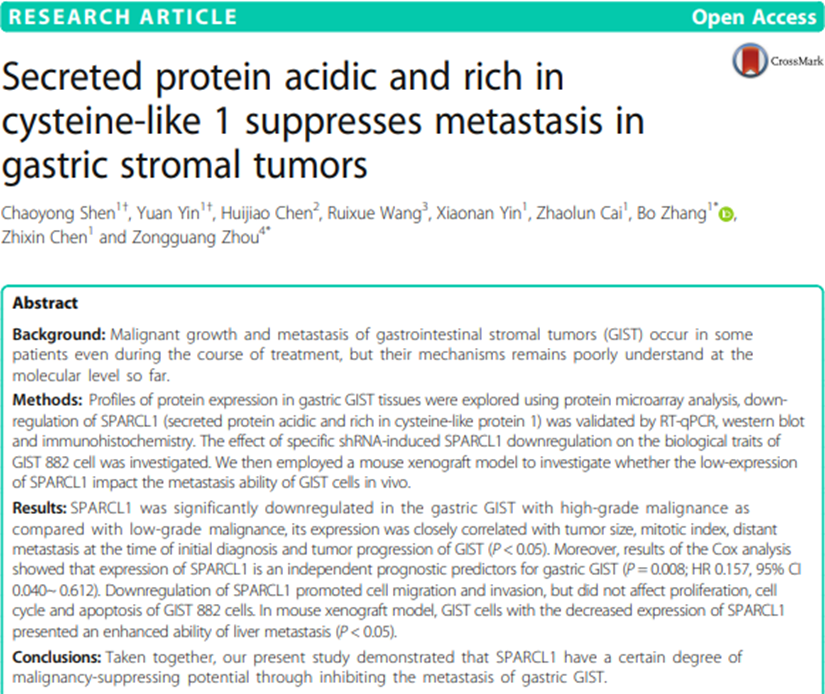
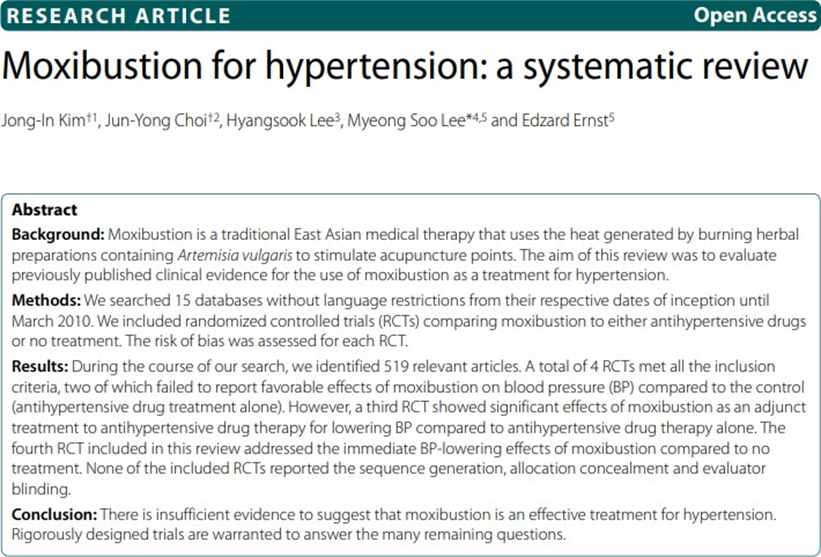
Introduction (around 1500 words)
The main purpose of this section, as well as providing a concise critical review of the literature relevant to your research study, is to provide a clear rationale or purpose for the research that you have done.
The introduction should provide background that puts the article into context and allows readers outside the field to understand the purpose and significance of your research. You should define the problem you are addressing and why it is important. You should include a brief review of the literature that is key to your research area and note any relevant gaps in this current research area. The introduction should be concluded with a clear statement of the purpose of the research, and the research question(s) should be clearly identified.
The introduction should essentially achieve the following:
1. Summarise existing research
2. Promote the need for your study by pointing out deficiencies in existing research.
Methods (around 1000 words)
The purpose of this section is to provide sufficient methodological information so that anyone who chooses to can evaluate the appropriateness (or validity) of your methods or can easily replicate it.
The Methods section should:
1. Tell the reader exactly what you have done;
2. Convince the reader that what you did was correct, i.e. it should clarify issues of validity, reliability, and describe widely accepted measurement techniques and protocols.
In order to aid clarity, it is important to arrange this information into sub-sections with subheadings. The methods section of a research article should be written in the past tense. Refer to previously published research articles methods sections for further guidance.
It is a good idea to ask someone who has no knowledge of your research to read this section. If it is detailed enough, the naïve reader should be able to exactly replicate your research.
Results (around 1000 words)
The results section should describe the results of your experiments. This section is normally supported by relevant figures and tables and includes clear empirical statements of your results analysis. Again, put yourself in the position of the reader. This section must contain sufficient detail to enable full understanding of the results, allowing a clear conclusion to be made.
The data should be presented in logical sequence which follows the logical progression of your research – subheadings are encouraged to structure the results section.
Remember that you should only show data once, in the form of a graph or table and not in both graph and table form. As a general rule do not merely insert either tables or graphical material directly from SPSS – recast these in Word (tables) or Excel/Prism (graphical material) with a focus on the relevant material. If using Graphpad Prism software, graphs are easily exportable directly into your article, or can be saved as an image for use.
The research article should include summary tables and figures as appropriate. It is recommended that no more than six tables/figures be included. Remember that multiple figures can be combined as one figure that is split into a number of parts (A, B, C etc.), but the information presented should be related.
Although it is imperative that you accompany each table/figure with a text explanation, you must not go beyond an objective explanation. The results section is not the place to interpret or discuss your findings. It is not sufficient to merely refer to the table as in: The results of the analysis are shown in Table 1. Thus, you should highlight the main features of the results in your text, but do not attempt to interpret them (leave this for your discussion). It is important that you refer to the relevant figure/table within the main text.
Discussion (around 1700 words)
This section provides the opportunity to `make sense' of your data in relation to previous research and your specific research question(s). The discussion is an important to section which allows you to demonstrate to the reader/marker that you can interpret the results correctly and that you understand the research undertaken.
The discussion section that allows you to put your work into a wider context; a description of each table and graph, which you included in the results section, is unlikely to be sufficient for a pass grade. You must attempt to synthesize your results and relate them to previous work – if the research was worth reviewing in the introduction, it is worth mentioning it again with respect to your findings.
Begin the discussion with a summary of the major findings (in relation to the aims of the study). Then proceed to explain systematically individual findings and support your discussion with relevant literature. In general, you should endeavor to determine whether the results:
You should write in an appropriately succinct style; this may be the section that lets you down. If you have relied too much on published work for the introduction, you may find it difficult to maintain the same style. You should aim to relate the findings of your study to most, if not all, the research evaluated in the introduction.
If you have followed the ‘hour-glass’ model of report writing, you will recall that the introduction became increasingly focused and ended with the hypotheses. The discussion should show a reversal of this pattern and begin with a statement emphasizing the primary findings of your study and whether or not the hypotheses were supported. The discussion should then become broader as these findings are discussed in relation to research that was reviewed in the introduction. Secondary findings (if appropriate) should also be discussed in a similar manner.
Do not worry if your findings are not consistent with those published previously. It is more important that you make an attempt to explain any inconsistencies; after all you are likely to have carried out your research under somewhat different conditions from that which was published. Inconsistencies with no explanation will be viewed somewhat negatively.
Limitations of your study should then be addressed along with implications these may have for your results (you may have begun to do this when explaining why your findings are not consistent with previous research in the area).
You should then make some recommendations for future research.
Conclusion (as a guide – 350 words)
Your report should end with concluding statements about the research. Your conclusions should provide a synthesis of your key results interpretations, and how these are relevant in a wider context – you should provide a succinct explanation of the implications of your findings.
The oral viva presentation will take place once you have submitted your research article and PowerPoint slides. Although oral presentations can be daunting, you will have had the opportunity to give at least one presentation in other modules, and the presentation is an opportunity to engage in discussion about the research you have undertaken.
There are a few key aspects to producing an effective oral presentation:
There will be no formative draft opportunities for the oral viva presentation – your supervisor will not be able to look at your slides, and you will not be able to practice with your supervisor. You are, however, encouraged to practice your presentation in front of family and/or friends or practice alone.
The formatting of the PowerPoint should conform to the following guidelines:
It is recommended that your PowerPoint presentation includes no more than 10 slides.
Attendance at your viva is compulsory – if you do not attend your viva to deliver your presentation, you will receive a mark of 0 unless a deferral has been approved.
You will first be asked to give an overview of your project in an introductory presentation (PowerPoint presentation), lasting no more than 15 minutes and covers the following:
The remaining time will be used for an investigatory discussion with the panel. This will allow you to engage in discussion about the research undertaken. Questions should last no more than 15 minutes.
Further guidance and support will be provided by your supervisor and in the dissertation support sessions.
Oral viva presentations will take place between 06th and 27th January 2025. You will be contacted nearer the time to advise you of the date and time of your viva. You will also be provided with more information about what you can expect on the day of your oral viva presentation.
Your viva presentation will normally be held at the University of Chester, you will be notified of the location of your viva nearer the time. If viva presentations are not able to be held face-to-face on campus due to COVID, viva presentations will take place over Teams.
Research Article
After submission of your research article, the work will be assessed by two markers. Your first marker will normally be your dissertation supervisor. The second marker will usually be another member of the academic team; this person will be looking at the work without prior discussions with you and hence will be able to give a fully independent view. It is possible that the supervisor will be able to “read between the lines” due to prior discussions – but you should not rely on this. The second, independent, marker will judge the work “as it is presented”. Each marker will review your research article independently without access to any views, marks, or feedback from the other marker. This is why it is important that you submit two copies of your research article via the Turnitin submission links.
Oral viva Presentation
You will deliver your oral viva presentation to two assessors: normally your supervisor and a second marker. Oral viva presentations will also be recorded for the external examiner and for the purpose of third marking, if required.
The dissertation assessments will be marked using marking criteria based on the University of Chester Level 7 Generic Marking Criteria. The marking criteria will be available on MD7100 Moodle Site.
The University has to operate within a predetermined annual schedule; the end point of which is the very formal ceremony at which degrees are conferred. The key elements of the final schedule relate to submission of the dissertation and hence it’s marking. The schedule is summarized on the following page:
|
Submission deadlines |
Monday 02nd December 2025 (Research article) Monday 09th December 2025 (Viva slides) |
|
Oral viva presentation |
06th - 27th January 2025 |
|
Marking completed |
Late February |
|
Local moderation to agree common mark |
March |
|
Transfer to Ext Examiner |
March |
|
Module Assessment Board |
March/April |
|
Awards Board |
April/May |
|
Graduation in Chester Cathedral |
2025 (where possible) |
If the two markers are in broad agreement (within the same grade boundary) then a recommended mark will be agreed (this is generally the case). On the rare occasions where a major difference of opinion applies a third marker will be asked to review the work.
The external examiner is then given the opportunity to review both your work and the mark recommended by the University markers. The external examiner is part of the quality assurance process and the key responsibility is to ensure that any grades awarded by the University of Chester are in line with those given on comparable programmes at other UK universities.
The Module Assessment Board (MAB) confirms the grades for dissertations and other assessed coursework. Please note marks and feedback for this module will not be available until after the assessment board.
The University Awards Board confirms matters such as degree awards and issues relating to annual progression for continuing students. Your dissertation outcomes will not be announced until after the University Awards Board in April.
If you have been successful then details relating to Graduation Ceremonies will follow. If you have not been successful then you will be given details of reassessment options. Please note if you are required to provide a reassessment for dissertation, your graduation will be delayed.
Appendix A Originality Declaration
To be included on the cover page of your research article
Appendix B Notes on Differentiating Between Research, Service Evaluation and Audit
|
RESEARCH |
CLINICAL AUDIT |
SERVICE EVALUATION |
|
The attempt to derive generalizable new knowledge including studies that aim to generate hypotheses as well as studies that aim to test them. |
Designed and conducted to produce information to inform delivery of best care. |
Designed and conducted solely to define or judge current care. |
|
Quantitative research – designed to test a hypothesis. Qualitative research – identifies/explores themes following established methodology. |
Designed to answer the question: “Does this service reach a predetermined standard?” |
Designed to answer the question: “What standard does this service achieve?” |
|
Addresses clearly defined questions, aims and objectives. |
Measures against a standard. |
Measures current service without reference to a standard. |
|
Quantitative research -may involve evaluating or comparing interventions, particularly new ones. Qualitative research – usually involves studying how interventions and relationships are experienced. |
Involves an intervention in use ONLY. (The choice of treatment is that of the clinician and patient according to guidance, professional standards and/or patient preference.) |
Involves an intervention in use ONLY. (The choice of treatment is that of the clinician and patient according to guidance, professional standards and/or patient preference.) |
|
Usually involves collecting data that are additional to those for routine care but may include data collected routinely. May involve treatments, samples or investigations additional to routine care. |
Usually involves analysis of existing data but may include administration of simple interview or questionnaire. |
Usually involves analysis of existing data but may include administration of simple interview or questionnaire. |
|
Quantitative research - study design may involve allocating patients to intervention groups. |
No allocation to intervention groups: the health care professional and patient have chosen intervention |
No allocation to intervention groups: the health care professional and patient have chosen intervention |
|
Qualitative research uses a clearly defined sampling framework underpinned by conceptual or theoretical justifications. |
before clinical audit. |
before service evaluation. |
|
May involve randomisation |
No randomisation |
No randomisation |
|
ALTHOUGH ANY OF THESE THREE MAY RAISE ETHICAL ISSUES, UNDER CURRENT GUIDANCE: - |
||
|
RESEARCH REQUIRES FREC REVIEW |
AUDIT DOES NOT REQUIRE FREC REVIEW |
SERVICE EVALUATION DOES NOT REQUIRE FREC REVIEW |
Appendix C University of Chester Guidance on Research Approvals and Permissions
The University of Chester Research Governance Handbook contains sets out procedures for the governance of research and related activities undertaken under the auspices of the University of Chester (‘the University’) and seeks to ensure a consistent research framework.
The following diagrams have been taken from the Research Governance Handbook and guide research approvals and permissions:
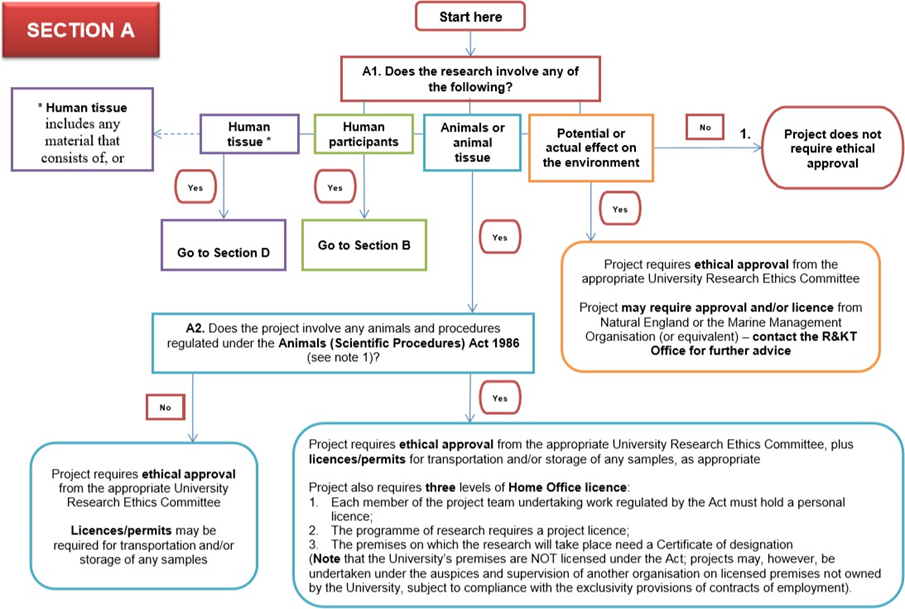
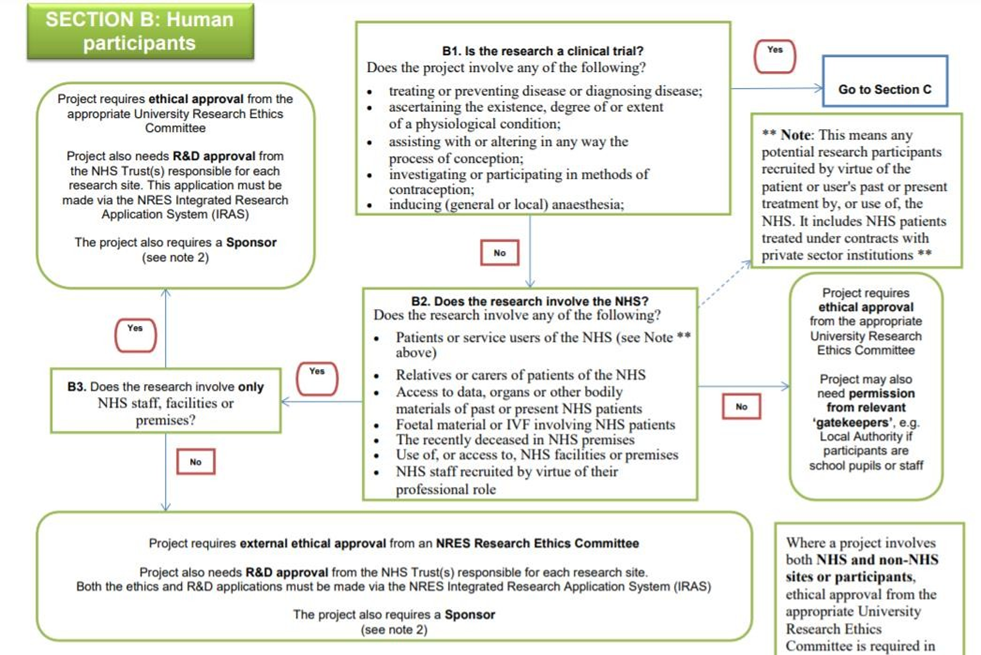
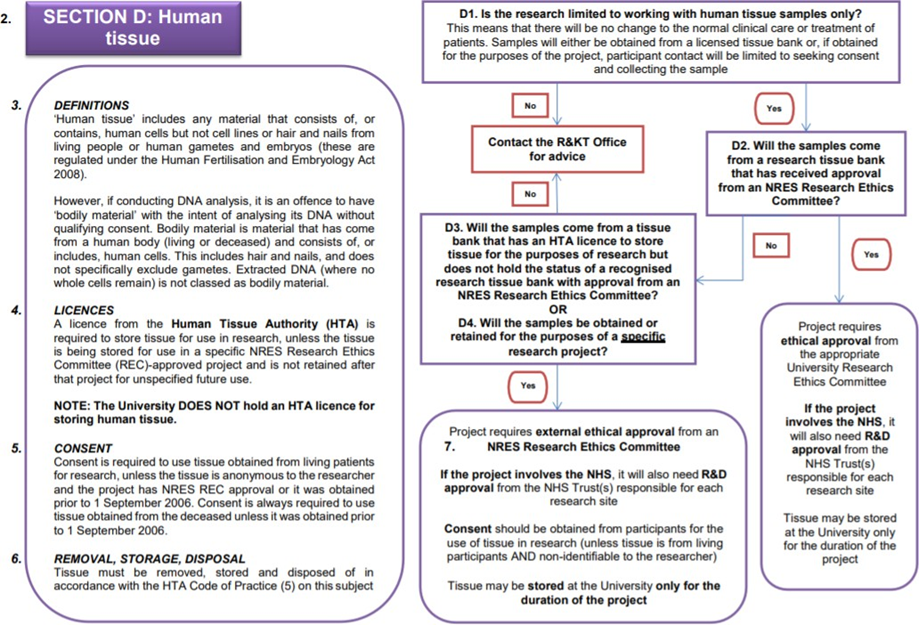
Appendix D Publishing Your Work
After completing the MSc many students (graduates) may wish to publish their work in a journal or to present it at an academic conference.
Publication is encouraged; however, students (graduates) should note the following conventions:
Publication / presentation should always be discussed with the project supervisor prior to submission.
It is a normal expectation that the project supervisor will be co-author to any publication arising from the MSc project. It may be appropriate for other members of the academic staff to also be named as co-authors.
The project supervisor will normally be named as the “corresponding author”.
Appendix E Academic Integrity
The University of Chester values its students' contribution to the necessary quality of its academic standards and awards by adhering to the principles of academic integrity and fair play in assessment. These standards are upheld when students, completing work for assessment, act honestly and take responsibility for the fair presentation of the contents of any work they produce for assessment. This means that students will do nothing that has the potential for them to gain an unfair advantage in assessment.
Clear guidance on Academic Integrity can be found on Portal under ‘Support Departments’ ‘Academic Quality Support Services’ ‘Academic Integrity’.
A copy of the academic integrity policy can also be found on MD7100 Moodle site under ‘GENERAL INFORMATION’
Maintaining Academic Integrity
In order to adhere to the University’s definition of academic integrity, students are expected to
abide by the following conventions when completing work for assessment:
Breaches of Academic Integrity
A student will be regarded as being in breach of the Academic Integrity Policy if they act or behave
in a manner that is inconsistent with the University’s general definition of academic integrity
A breach of the Academic Integrity Policy may occur when a student knowingly acts in a way that is contrary to the policy or does so inadvertently using careless scholarship. Inexperience, intention, lack of intention or unfamiliarity with the Academic Integrity Policy will not be regarded as a defence if the policy is breached.
Any breach of the Academic Integrity Policy will be categorised as either unacceptable academic practice or academic misconduct. These are dealt with in different ways according to the published procedures.
Examples of unacceptable academic practice:
Examples of Academic Misconduct:
The University of Chester takes breaches of the Academic Integrity Policy very seriously.
Information regarding the procedures for a suspected breach of the Academic Integrity Policy can be found on the Portal.
Need plagiarism-free Answers for your college/ university MD7100 Dissertation
Order Non-Plagiarised DissertationGet expert dissertation helper for MD7100 Research Dissertation Handbook ! We specialise in offering high-quality assignment help, with an option for students to pay our experts to take on their assignment challenges. Need a reference? We also provide a free list of dissertation examples to help you get started. With years of experience, our writers deliver 100% plagiarism-free content and offer unlimited revisions to meet your needs. Trust us to help you excel in your studies!
Hire Assignment Helper Today!
Let's Book Your Work with Our Expert and Get High-Quality Content
